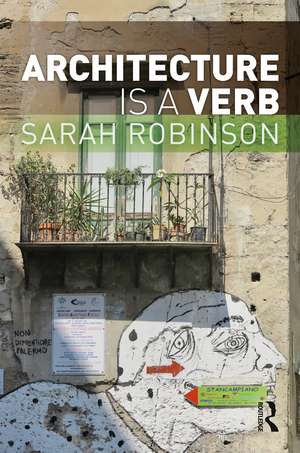Architecture is a Verb
Autor Sarah Robinsonen Limba Engleză Hardback – 2 mar 2021
Written in engaging prose for students of architecture, interiors and urban design, as well as practicing professionals, Sarah Robinson offers richly illustrated practical examples for a new generation of designers.
| Toate formatele și edițiile | Preț | Express |
|---|---|---|
| Paperback (1) | 281.03 lei 3-5 săpt. | +21.82 lei 10-14 zile |
| Taylor & Francis – 2 mar 2021 | 281.03 lei 3-5 săpt. | +21.82 lei 10-14 zile |
| Hardback (1) | 766.16 lei 6-8 săpt. | |
| Taylor & Francis – 2 mar 2021 | 766.16 lei 6-8 săpt. |
Preț: 766.16 lei
Preț vechi: 1028.56 lei
-26% Nou
Puncte Express: 1149
Preț estimativ în valută:
146.60€ • 153.48$ • 121.31£
146.60€ • 153.48$ • 121.31£
Carte tipărită la comandă
Livrare economică 05-19 aprilie
Preluare comenzi: 021 569.72.76
Specificații
ISBN-13: 9780367610371
ISBN-10: 036761037X
Pagini: 274
Ilustrații: 1 Line drawings, black and white; 59 Halftones, black and white; 1 Tables, black and white; 61 Illustrations, black and white
Dimensiuni: 152 x 229 mm
Greutate: 0.56 kg
Ediția:1
Editura: Taylor & Francis
Colecția Routledge
Locul publicării:Oxford, United Kingdom
ISBN-10: 036761037X
Pagini: 274
Ilustrații: 1 Line drawings, black and white; 59 Halftones, black and white; 1 Tables, black and white; 61 Illustrations, black and white
Dimensiuni: 152 x 229 mm
Greutate: 0.56 kg
Ediția:1
Editura: Taylor & Francis
Colecția Routledge
Locul publicării:Oxford, United Kingdom
Public țintă
Postgraduate, Professional, Undergraduate Advanced, and Undergraduate CoreCuprins
1. Situated Poetics 2. From Vitruvius to the Resonant Body 3. Extended Organisms—Surrogate Bodies 4. Questioning Perception 5. Constructing Consciousness 6. Taxonomy of Interactions 7. The Primacy of Breathing: Breathing - Resisting - Touching 8. Homo Faber: Resonating - Dancing - Making 9. Collective Dreaming: Imagining - Remembering - Storytelling 10. This Rebellious Field: Abstracting - Framing - Thinking 11. The Soil of the Sensible: Inhabiting - Playing - Healing 12. Fields of Care Appendix: Chart of the Taxonomy of Interactions
Notă biografică
Sarah Robinson is an architect practising in San Francisco and Pavia, Italy. She holds degrees in philosophy and architecture, and was the founding chair of the Frank Lloyd Wright School of Architecture Board of Trustees. Her previous books—Mind in Architecture: Embodiment, Neuroscience and the Future of Design with Juhani Pallasmaa (2015) and Nesting: Body, Dwelling, Mind (2011)—have been among the first to explore the connections between the cognitive sciences and architecture. She co-founded and edits the journal Intertwining, is an adjunct professor at Aalborg University, Denmark and teaches at NAAD / IUAV University of Venice.
Recenzii
A veritable encyclopedia of ideas, all pressing toward one sage insight: good design—far from being an act of technocratic rationality—resides in the poetic, festive, and cultural interplay between self and other, or better, the art of exploring the depth of our visceral engagement with the world. All else is inhumanity.
—Harry Francis Mallgrave, Emeritus Director of Architectural and Theory program at Illinois Institute of Technology and the author of The Architect’s Brain, Architecture and Embodiment and From Object to Experience, among other books.
Robinson’s clear prose brings hope—stitching together insights from philosophy, existential phenomenology, the cognitive sciences, ethology, psychology, anthropology, architectural and literary history, to shed light on possibilities that are open to designers and architects in our complex world. . . in an intellectual poetics meant to evoke, resonate and make you think.
—Alberto Pérez Gómez, Director of the History and Architecture Program at McGill University and author of Architecture and the Crisis of Modern Science, Built Upon Love and Attunement, among other books.
Architecture has been incessantly theorized, taught and practiced merely as an art of aestheticised material structures and space. Sarah Robinson presents architecture convincingly and inspiringly as a network of relationships, actions and interactions; buildings reveal, structure and articulate our encounters and relations with the world. Through deftly weaving knowledge from diverse disciplines ranging from philosophy to psychology, anthropology to neuroscience and history to poetics—this book opens up comprehensive and balanced but truly radical views of the complex phenomenon of architecture. The reader will surely encounter and experience buildings differently after having read this significant book.
—Juhani Pallasmaa, Architect, Professor emeritus (Aalto University), Writer, Member of the Pritzker Architecture Prize Jury, 2008-2014
—Harry Francis Mallgrave, Emeritus Director of Architectural and Theory program at Illinois Institute of Technology and the author of The Architect’s Brain, Architecture and Embodiment and From Object to Experience, among other books.
Robinson’s clear prose brings hope—stitching together insights from philosophy, existential phenomenology, the cognitive sciences, ethology, psychology, anthropology, architectural and literary history, to shed light on possibilities that are open to designers and architects in our complex world. . . in an intellectual poetics meant to evoke, resonate and make you think.
—Alberto Pérez Gómez, Director of the History and Architecture Program at McGill University and author of Architecture and the Crisis of Modern Science, Built Upon Love and Attunement, among other books.
Architecture has been incessantly theorized, taught and practiced merely as an art of aestheticised material structures and space. Sarah Robinson presents architecture convincingly and inspiringly as a network of relationships, actions and interactions; buildings reveal, structure and articulate our encounters and relations with the world. Through deftly weaving knowledge from diverse disciplines ranging from philosophy to psychology, anthropology to neuroscience and history to poetics—this book opens up comprehensive and balanced but truly radical views of the complex phenomenon of architecture. The reader will surely encounter and experience buildings differently after having read this significant book.
—Juhani Pallasmaa, Architect, Professor emeritus (Aalto University), Writer, Member of the Pritzker Architecture Prize Jury, 2008-2014
Descriere
Architecture is a Verb outlines an approach that shifts the fundamental premises of architectural design and practice. It asks what a building does—that is, extends the performative functional interpretation of design to interrogate how buildings move and in turn move us, how they shape thought and action.
